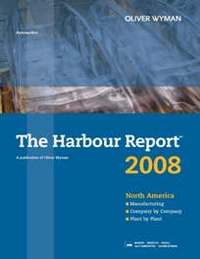Harbour Report Says Detroit 3 More Productive But Still Losing Money Per Vehicle
 |
DETROIT June 5, 2008; Dee-Ann Durbin writng for the AP reported that Detroit automakers -- and Chrysler in particular -- nearly erased the North American productivity gap with their Asian rivals in 2007 thanks to worker buyouts, leaner plants and other improvements, but they still make less money per vehicle because of higher costs, according to the Harbour Report on manufacturing released Thursday.
Toyota Motor Corp. and Chrysler LLC led the industry in productivity, with each averaging 30.37 hours to fully assemble a vehicle. That was a 7.7 percent improvement for Chrysler from 2006, but a 1.5 percent drop for Toyota. Toyota's inefficiencies were largely due to the rapid shift away from trucks and sport utilities as gas prices rose, according to Ron Harbour, a partner in the automotive consulting firm Oliver Wyman whose father began producing the annual Harbour Report in 1994.
Honda Motor Co., General Motors Corp., Nissan Motor Co., Ford Motor Co. followed Toyota and Chrysler, with a productivity gap of no more than 3.5 hours, down from a gap of as much as eight hours five years ago. Hyundai Motor Co., whose Montgomery, Ala., plant was participating in the report for the first time, had the lowest productivity rate of 35.10 hours per vehicle.
GM, Ford and Chrysler are in the midst of significant restructurings that have included 35 plant closures and the buyouts of more than 89,000 manufacturing workers since 2005. GM said this week it will close four North American plants by 2010, and Ford recently announced production cuts and layoffs because of a steep drop in SUV and truck sales.
Harbour said the Detroit Three's ability to improve productivity under those circumstances has been impressive and will help them as competition grows fiercer and consumers move to smaller, less profitable vehicles. Harbour said automakers have to sell as many as 10 small cars to squeeze the same profits they can get from one truck or SUV.
"It's almost like Rocky. They're in the fight of their lives, but at least they're going into this fight as fit, from a manufacturing standpoint, as they've ever been," Harbour said. "That part is the bright spot."
Still, the Detroit Three are lagging in profits per vehicle because of higher costs for health care, pensions, sales incentives and the higher number of dealerships they support. Ford lost $1,467 per vehicle in 2007, while GM lost $729 and Chrysler lost $412, the report said. Toyota made $922 per vehicle, while Honda and Nissan both made $1,641. That gap is expected to narrow significantly in 2010, when the Detroit automakers hand over their retiree health care liabilities to new independent trusts overseen by the United Auto Workers union.
The report is closely watched by the industry, but Harbour said the data is important to consumers, too, since improved productivity frees up money that can be plowed back into vehicle development and improved value. Productivity improvements also usually correlate to improvements in quality, since automakers can cut back on overtime and time spent repairing mistakes when their vehicle quality is better.
But there are exceptions. Chrysler's Toledo South plant, which makes the Jeep Wrangler, was the most productive assembly plant in North America in 2007 after improving its productivity by 38 percent to 13.57 hours per vehicle. But Jeep had the lowest quality rating of any brand in a J.D. Power and Associates survey released Wednesday. The survey measures both mechanical and design problems in the first 90 days of vehicle ownership.
Frank Ewasyshyn, Chrysler's vice president of manufacturing, said Thursday that productivity doesn't really relate to quality, and that Chrysler is working hard to improve its quality.
"The quality piece for us still continues to be a journey," he said.
Ewasyshyn said Chrysler made dramatic improvements in productivity because of new automation, increasing shifts in some plants, better engineering of the assembly line and new flexible processes to allow more kinds of vehicles on one line.
Honda and Nissan didn't participate in this year's study, so estimates were based on publicly available data, Harbour said.
Honda spokesman Ed Miller said Honda has participated in the past but decided the report didn't give it enough information to justify the fees and staff time spent on it.
"We do our own in-house efficiency studies, and that's our primary way of judging efficiencies," he said.
Nissan also cited the cost and time spent on the report.
Harbour Consulting: http://harbourinc.com/


